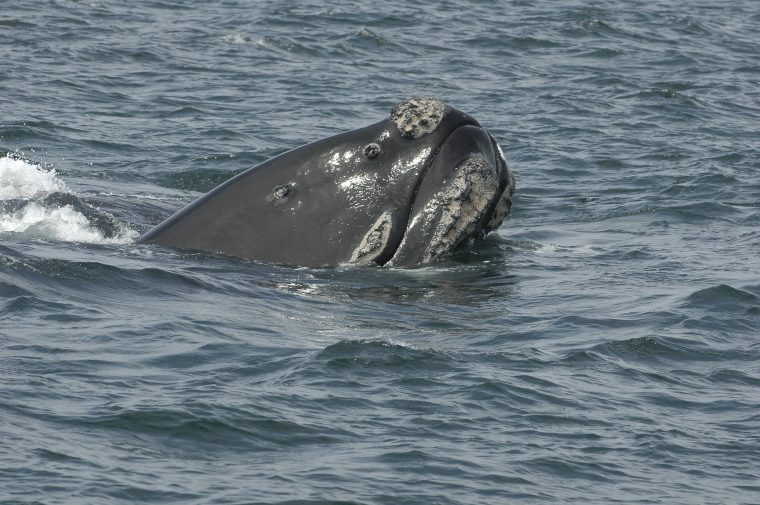NOAA confirms whale died from a vessel strike as scientists draw attention to ongoing human-caused threats

BOSTON, MASS. (Feb. 16, 2023) – Scientists at the New England Aquarium are reacting to the death of a North Atlantic right whale as the critically endangered species continues to face human-caused threats.
The whale washed ashore Sunday in Virginia Beach, VA. New England Aquarium scientists identified the whale as Catalog #3343, an unnamed 20-year-old male. Following a necropsy by multiple agencies, NOAA announced the cause of death as catastrophic blunt force trauma. The injuries to the whale’s spine are consistent with a vessel strike, NOAA said, and included multiple fractures to the vertebrae that indicated he died quickly. There were no external signs of trauma.
“It has been a challenging few weeks for right whales, and for those that care about them. Four newly entangled whales have been discovered since the beginning of January and now #3343’s death. And all of the whales with families that we know well,” said Philip Hamilton, senior scientist at the New England Aquarium’s Anderson Cabot Center for Ocean Life.
This cause of death is drawing attention to the ongoing challenges facing North Atlantic right whales, a critically endangered species with fewer than 350 individuals estimated remaining in the population. The Aquarium has advocated for solutions grounded in scientific research to help this struggling species recover, including broader speed restrictions to reduce the risk of vessel strikes for right whales throughout their range. As right whales shift their habitat use as a result of climate change and availability of food resources, the animals are at greater risk throughout the East Coast of the U.S. and Canada of both vessel strikes and entanglements in fishing gear.
For more than 40 years, right whale life histories have been tracked using the North Atlantic Right Whale Catalog, an extensive photo-identification database curated by scientists at the New England Aquarium. Individual whales are identified by a number and sometimes a name, with the website including details such as sex, physical markings, and last sightings. Prior to his death, scientists last saw Catalog #3343 off the coast of Georgia on December 26, 2022. Researchers had documented fishing gear entanglement injuries three times over his lifetime—including when Catalog #3343 was a calf in 2003. Sadly, his family also has a history of vessel strikes. His aunt, “Reyna” (Catalog #1909), was struck and killed by a ship in 2004 while carrying a near-term fetus. His eldest sister, “Lucky” (Catalog #2143), suffered a vessel strike as a calf and survived until the age of 14 when her first pregnancy caused her old wounds to reopen. Another sister, “Caterpillar” (Catalog #3503), also suffered a vessel strike at the age of two and managed to survive with the significant injury and is currently 18 years old. She has yet to give birth, but researchers fear a pregnancy could lead to a similar fate as Lucky.
“This whale, born to mother ‘Magic’ and father ‘Thorny,’ was just recently of age when he could potentially father calves. Sadly, he wasn’t given the opportunity to do so.” said Hamilton, who leads the team of right whale researchers at the Aquarium.
In recent weeks, right whales have been seen from their calving grounds in the southeastern United States, throughout the mid-Atlantic, and further north in Massachusetts. Earlier this week, New England Aquarium scientists flying an aerial survey spotted more than 20 right whales south of Nantucket with dozens more sighted in Cape Cod Bay since January.
The news of Catalog #3343’s death comes amid the loss of a neonate and a high number of right whale entanglements. Since December, four entangled right whales have been observed. While disentanglement teams have had some success in freeing the whales of heavy ropes and gear, the lingering injuries affect their health and chance of survival.
“I’m often asked if we are doing enough to protect right whales. While important steps have been made to protect these whales in both the U.S. and Canada, the whales themselves are showing us through these entanglements and this death that clearly more needs to be done,” Hamilton said.
MEDIA CONTACT:
Pam Bechtold Snyder – psnyder@neaq.org, 617-686-5068
